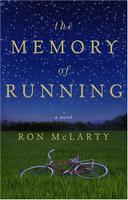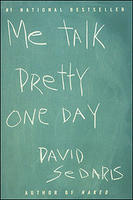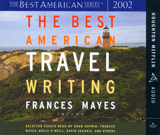I probably shouldn't admit this, but instead of reading, I've been putting books into my library over at Bibliophil. It's way too much fun, and I'm really glad I found it before I got too far into doing my book catalog. This way there are pictures and it's searchable and you can arrange the books in different way, like by whether you own them or whether you've read them. You can arrange your library by author, book, rating, etc. And you can have "buddies" to whom you can recommend titles.
There are a few kinks, but it's free, so I'm not complaining too much. I'm sure it will all be worked out eventually. The best part, the part that makes me forget about any glitches, is that you can EXPORT YOUR LIST.
This is just what that book-obsessive part of me -- you know, the part that's always worried about having to replace my library and becoming overwhelmed and having no idea what was in it -- needed.
Here's the link to my library, if you're interested.
Wednesday, August 17, 2005
Sunday, August 14, 2005
forty-five/fifty-two
 I'll admit I picked up The Memory of Running mostly because of Stephen King's column on it. Back when it was only available as an audiobook, he wrote this glowing review about the writing and about how Smithy was one of the most memorable and original characters ever, etc., etc. He made the book sound really good, is what I'm saying.
I'll admit I picked up The Memory of Running mostly because of Stephen King's column on it. Back when it was only available as an audiobook, he wrote this glowing review about the writing and about how Smithy was one of the most memorable and original characters ever, etc., etc. He made the book sound really good, is what I'm saying.I forgot about it for a little while then saw it on a list somewhere of good summer reads or something, and remembered King's enthusiasm, so I reserved it at the library. There was actually a waiting list, which is usually a good sign.
So the wee hours of this morning found me finishing Ron McLarty's The Memory of Running. It was good. I almost couldn't believe how good it was. It's the story of Smithy, this enormous guy who decides -- or it's kind of decided for him, really -- to go on a long cross-country bike ride. So there are a lot of mini-adventures there. It's also his sister's story, and that part of it is pretty sad. Once again I've made a book sound much lamer than it is, but it's written very well, and Smithy is the best kind of Everyman, accessible and mostly likeable without being cloying. And the story just flows from page to page, there are no slow parts.
So thank you, Mr. King. One day I'll read one of your books, too.
Saturday, August 13, 2005
forty-four/fifty-two
 A Blind Man Can See How Much I Love You is a collection of short stories by Amy Bloom. Every story is as perfectly crafted as that title. Even the cover is perfect.
A Blind Man Can See How Much I Love You is a collection of short stories by Amy Bloom. Every story is as perfectly crafted as that title. Even the cover is perfect.The stories are all about ordinary people doing semi-strange things, but the writing is so beautiful that even the most everyday details seem almost magical. The most horrible things people do in her stories seem strangely pretty when she writes about them.
I borrowed this one from the library -- I'm definitely adding it to my collection, though. And I'll be hunting down anything else by Bloom as well.
forty-three/fifty-two
 I think the audiobook (cassette) version of David Sedaris's Me Talk Pretty One Day might have been abridged, but I'm not sure. Either way, it's still excellent. Remember back when I disliked David Sedaris? When I made the mistake of reading Holidays on Ice as my Sedaris introduction? That was pretty dumb, huh?
I think the audiobook (cassette) version of David Sedaris's Me Talk Pretty One Day might have been abridged, but I'm not sure. Either way, it's still excellent. Remember back when I disliked David Sedaris? When I made the mistake of reading Holidays on Ice as my Sedaris introduction? That was pretty dumb, huh?There were a couple of essays on here that weren't quite as good as the rest, but that's a pretty low bar to limbo under, so I won't count that against it. I actually saved this audiobook as a treat for the workweek, that's how much I enjoy listening to Sedaris read his own stuff. And the stuff is pretty good in its own right, as well. Like the piece about learning French -- that was one of my favorites. Of course, it was also pretty cool to HEAR Sedaris's Billie Holiday impersonation, so I'd rec this one even if you've already read the book, really.
A+++++!!!!, as they say on eBay.
Friday, August 05, 2005
forty-two/fifty-two
 I am in love with audiobooks. I can't say it enough. Before I found out that my library has a rather decent selection, I dreaded the drive into and back from work -- a forty-five minute trip each way -- because it felt like such a waste of time. Now I feel like I'm actually getting something accomplished.
I am in love with audiobooks. I can't say it enough. Before I found out that my library has a rather decent selection, I dreaded the drive into and back from work -- a forty-five minute trip each way -- because it felt like such a waste of time. Now I feel like I'm actually getting something accomplished. This edition of The Best American Travel Writing, edited by Frances Mayes, is a collection of the best travel writing from 2002. For the most part, the selections are read by their authors, which is cool. I love hearing authors read their own work. When they're not read by their respective authors, the pieces are read by Frances Mayes. She has a pretty voice, very Southern and soothing; however, it's such a soothing voice that I couldn't concentrate on the pieces she read, and my mind kept wandering, so that wasn't too great. The other authors (including David Sedaris!) mostly had good reading voices, with a few exceptions, but even the exceptions weren't horrible.
The selections themselves are a mixed bag; they were all okay, but half of them were too dry and static, full of long descriptions that might make for good reading but make for boring listening. The great ones, like "Forty Years in Acapulco," "In the Land of the White Rajahs," and "Home for Dinner," made up for it, though.
I would recommend getting this one from the library, but only if you already have an interest in travel writing. I wouldn't recommend buying it. I should also note that this is an abridged version of the book -- there are less than a dozen pieces on the four CDs that make up the audiobook, and the actual book has over twenty.
If you want it in book form instead of CD, The Best American Travel Writing 2001 is supposed to be better than this edition, so I think I'd try that one before seeking out the full 2002 edition.
Tuesday, August 02, 2005
forty-one/fifty-two
 It's high time for a "Buffy" book, don't you think? The Lost Slayer is a four-part serial novel (aka "we can make you buy four books at three bucks a pop which is a third more dinero than if we stuck these all together in one book, hahaha!") written by my favorite "Buffy" novelist, Christopher Golden. Most of Golden's books are well edited, well plotted, and well characterized. A lot of "Buffy" books have serious problems with characterization, or horribly lame plots, or, worse, the saddest editing ever. Like names that are spelled wrong or facts that aren't actually facts.
It's high time for a "Buffy" book, don't you think? The Lost Slayer is a four-part serial novel (aka "we can make you buy four books at three bucks a pop which is a third more dinero than if we stuck these all together in one book, hahaha!") written by my favorite "Buffy" novelist, Christopher Golden. Most of Golden's books are well edited, well plotted, and well characterized. A lot of "Buffy" books have serious problems with characterization, or horribly lame plots, or, worse, the saddest editing ever. Like names that are spelled wrong or facts that aren't actually facts.ANYWAY, this one was good. Buffy and Co. have to fight the god of bats, and along the way Buffy gets sucked into a future that is extraordinarily of the bad. She has to fight to fix the badness as well as figure out how to get back to her present in time to stop herself from making the mistake that leads to this future.
This one has actually been sitting on my shelf for a couple of years; I'm glad I got around to reading it. It's most excellent.
crazy
The family whom Augusten Burroughs wrote about in Running with Scissors (I don't think I reviewed that here, but I liked it, although it was a little disturbing) -- you know, the insane family with the psychiatrist dad? -- is suing Burroughs over his depiction of their family.
It's weird, but I think I feel a little worse for him than I would have if I hadn't heard him talk on the audiobook. Bizarre.
(link via Bookslut)
It's weird, but I think I feel a little worse for him than I would have if I hadn't heard him talk on the audiobook. Bizarre.
(link via Bookslut)
Subscribe to:
Comments (Atom)
